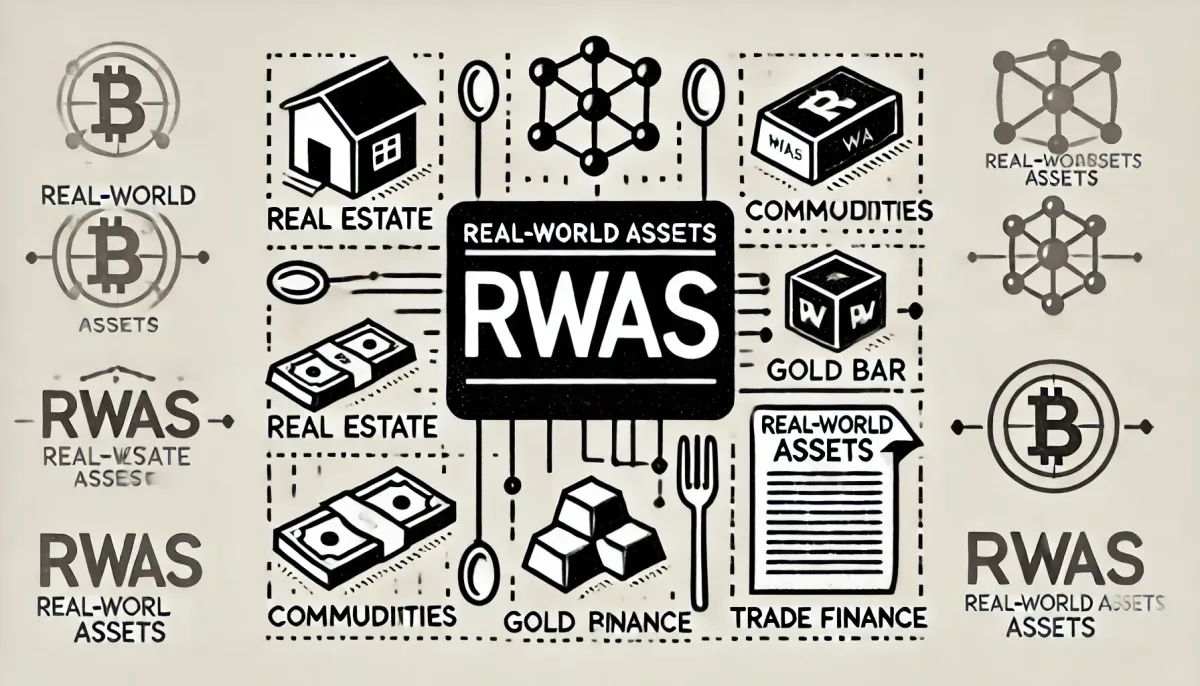As the global financial landscape rapidly evolves, two significant forces are converging: the rise of decentralized finance (DeFi) and the growth of Islamic finance. At the core of this intersection lies Real-World Assets (RWAs), which, when tokenized and integrated into DeFi platforms, present a groundbreaking opportunity for Halal-compliant investments. By using blockchain technology to digitize tangible assets such as real estate, commodities, and trade finance instruments, Muslim investors can access new and ethically aligned financial opportunities. In this article, we explore how RWAs are transforming Islamic DeFi and why they represent the future of Halal investments.
Understanding RWAs and Tokenization in the DeFi Space
To fully appreciate the impact of RWAs, it's important to understand how tokenization works. Tokenization refers to the process of converting ownership rights of physical, tangible assets into digital tokens that can be traded on blockchain platforms. These tokens represent fractional ownership of assets like real estate, commodities (e.g., gold), or even equity in businesses. Each token is backed by a real-world asset, and smart contracts help automate compliance, management, and transaction tracking.
The global market for tokenized assets is expected to grow exponentially. According to a 2021 report from the World Economic Forum, tokenized assets could represent up to 10% of global GDP, or $24 trillion, by 2027. This growth potential is particularly appealing for Islamic finance, where asset-backed financial structures are the foundation of Shariah compliance.
Why RWAs Matter in Islamic Finance
Islamic finance operates on principles that strictly prohibit interest (Riba) and speculative transactions (Gharar), requiring that all financial activities be linked to real economic activity and underpinned by tangible assets. This focus on asset-backed transactions aligns perfectly with RWAs, as they inherently tie financial products to physical value, avoiding speculative risks. Here's why RWAs are crucial for the future of Islamic finance:
1. Shariah-Compliant, Asset-Backed Financing
RWAs offer an innovative pathway for creating financial products that comply with Shariah law. Unlike conventional financial products that may be interest-based or speculative, RWAs ensure that investments are grounded in real assets, such as property, commodities, or trade receivables.
For example, the traditional Ijara (lease-to-own) and Murabaha (cost-plus financing) contracts often used in Islamic finance could be enhanced by tokenization. Instead of managing physical properties or tangible goods on paper, blockchain technology allows these assets to be digitally represented, improving transparency, efficiency, and liquidity. A real estate-backed Murabaha contract, for instance, could be tokenized and traded on a blockchain platform, allowing fractional ownership and faster liquidity for investors.
2. Enhanced Liquidity
One of the key challenges in Islamic finance has been liquidity. Islamic financial products such as Sukuk (Islamic bonds) and real estate investments are often long-term and difficult to trade, which limits flexibility for investors. RWAs solve this problem by tokenizing physical assets and allowing fractional ownership, which can be easily traded on decentralized platforms.
According to a study by Deloitte, tokenized assets offer up to 40% increased liquidity compared to traditional ownership models. For example, a tokenized real estate asset can be sold in small fractions, allowing investors to exit their positions without having to sell the entire asset, thus unlocking liquidity in otherwise illiquid markets.
This liquidity is especially beneficial for Islamic finance, where the demand for asset-backed investments continues to grow. Investors who once had limited access to large, illiquid investments can now participate in high-value asset classes, such as real estate or commodities, with smaller amounts of capital.
3. Global Access to Islamic Investments
RWAs on blockchain offer the ability to break down geographic barriers, allowing Muslim investors worldwide to access investment opportunities in markets that were previously out of reach. Traditionally, cross-border Islamic finance has been constrained by local regulations, currency exchange, and other logistical issues.
For example, a real estate investment in a premium market like Dubai or London could be tokenized, allowing investors from Malaysia, Indonesia, or Saudi Arabia to purchase fractional ownership. Blockchain technology eliminates intermediaries and reduces friction, making cross-border Islamic finance faster, cheaper, and more compliant with local laws.
This also benefits issuers of RWAs, as they can tap into a global pool of liquidity and investors who adhere to Shariah principles, thus expanding the market for Halal investment products.
Real-World Examples of RWAs in Islamic Finance
To illustrate the growing potential of RWAs in Islamic finance, let's explore a few key examples where tokenization is already transforming traditional asset classes:
1. Tokenized Sukuk: The Future of Islamic Bonds
Sukuk, the Islamic equivalent of bonds, are asset-backed securities that comply with Shariah law by representing ownership in an underlying asset. Sukuk are a popular investment vehicle in the Muslim world, but they have traditionally suffered from illiquidity and long-term lock-ins.
In 2020, the Dubai government issued its first blockchain-based Sukuk, which was tokenized to allow greater liquidity and flexibility. Investors could buy and sell Sukuk tokens on a decentralized marketplace, ensuring that ownership rights were transferred instantly and transparently. Tokenized Sukuk not only increases accessibility for smaller investors but also ensures that Shariah-compliant assets can be traded more easily across borders.
2. Real Estate Tokenization: Making Property Investments Accessible
Real estate is one of the largest asset classes in Islamic finance, given its alignment with the asset-backed requirements of Shariah law. Platforms like Ethis and Finhaven have started offering tokenized real estate investments specifically designed for Muslim investors. By tokenizing real estate, these platforms allow for fractional ownership, meaning that even small investors can own a portion of large commercial properties or residential developments.
For instance, a high-value property in London could be split into thousands of tokens, each representing a small share of ownership. These tokens could then be traded on a blockchain marketplace, giving investors liquidity while maintaining their compliance with Islamic financial principles.
Real estate tokenization is particularly appealing for Waqf (Islamic charitable endowments) and Zakat (obligatory almsgiving) funds, as it offers new ways to manage and distribute large assets while maintaining transparency and accountability.
3. Gold-Backed Cryptocurrencies: Stable and Halal
Gold has long been considered a stable and Shariah-compliant asset for Muslim investors. In recent years, several platforms have launched gold-backed cryptocurrencies, which are digital tokens tied to physical gold reserves. These tokens allow investors to gain exposure to the value of gold while benefiting from the efficiency and transparency of blockchain technology.
For example, OneGram is a Shariah-compliant cryptocurrency that is backed by physical gold. Each OneGram token represents one gram of gold, providing investors with a stable, tangible asset that avoids the volatility and speculative nature of conventional cryptocurrencies like Bitcoin. This innovative approach makes it easier for Muslims to invest in gold in a fully compliant, digital format.
The Role of Smart Contracts in Shariah Compliance
One of the most exciting features of blockchain technology in the context of Islamic finance is the use of smart contracts. Smart contracts are self-executing contracts with the terms of the agreement directly written into code. These contracts automatically execute when certain conditions are met, reducing the need for intermediaries and ensuring compliance with predefined rules.
In Islamic finance, smart contracts can be programmed to automatically enforce Shariah compliance. For instance, a smart contract could be designed to distribute profits from a Murabaha agreement in accordance with pre-agreed profit-sharing ratios. If certain conditions violate Islamic principles (e.g., if interest is involved), the smart contract will not execute, ensuring full compliance.
Moreover, smart contracts increase transparency and trust, as all transactions are recorded on an immutable blockchain ledger. This transparency is particularly important for Islamic finance, where ethical and responsible investing is paramount.
Challenges and Considerations
While the potential for RWAs in Islamic DeFi is enormous, several challenges need to be addressed to ensure widespread adoption:
1. Regulatory Frameworks
Tokenizing real-world assets involves complex legal, tax, and compliance issues, particularly when dealing with cross-border transactions. To ensure that tokenized assets are legally recognized and enforceable, governments and regulators need to create clear and standardized frameworks for their use. Countries with large Muslim populations, such as the UAE, Saudi Arabia, and Malaysia, are already exploring regulatory sandboxes to experiment with blockchain and DeFi innovations.
2. Shariah Certification
Ensuring that all tokenized RWAs are Shariah-compliant is another critical challenge. Islamic finance experts and scholars will need to work closely with blockchain developers to create standards and certifications for compliance. Platforms like STO Global Exchange and Bursa Malaysia are pioneering efforts to launch Shariah-certified tokenized products, but the road ahead will require ongoing collaboration.
3. Technological Literacy
While DeFi and RWAs offer great potential, many investors and institutions lack the technical knowledge to navigate this new space. Educating investors, developers, and regulators on how to safely and effectively use these technologies will be crucial for their widespread adoption in Islamic finance.


